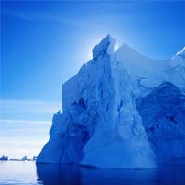The two-day scientific meeting took place at the Royal Society in London, the national academy of science.
The main aim of the meeting, co-organised by Tony Payne, Professor of Glaciology at the University of Bristol, is to determine whether recent dramatic changes in the ice sheet can be attributed to climate change caused primarily by a rise in atmospheric concentrations of greenhouse gases.
It will feature presentations about the controversy over the impact that changes in the Antarctic ice sheet are having on sea levels around the world.
It is anticipated that its findings will influence the Fourth Assessment Report from the Intergovernmental Panel on Climate Change [IPCC], which is due to be published in 2007.
Professor Payne said: "The future of the Antarctic ice sheet is critical to the amount of global sea-level change that could occur over the coming centuries because it represents the largest potential source of ocean water on the planet. The melting of the ice contained in West Antarctica would lead to a sea level rise of five or six metres around the world, or sufficient to cause effects such as the inundation of much of the state of Florida.
"A rise in global average temperatures due to an increase in greenhouse gas concentrations could cause sea levels around the world to rise for three main reasons. Firstly, warming the water in seas and oceans will cause it to expand. Secondly, the melting of glaciers and ice sheets will increase the amount of water in seas and oceans. And finally, if ice on land breaks up and falls into the oceans and seas, it will displace water, like dropping ice cubes into a glass of water.
"Recent evidence strongly suggests that parts of the Antarctic ice sheet are losing mass, and contributing to sea-level rise, at rates far greater than has been previously thought. Much of the evidence comes from satellite observations of the ice sheet, which have revolutionised the way in which we view the ice sheet and have highlighted a range of ways in which the ice sheet may respond to climate change over the period of years to decades, and much faster than previously thought. These mechanisms are not included in the large-scale models currently used to predict the contribution of the Antarctic ice sheet to future sea levels. One of the major outcomes of this meeting will be new ideas about ways in which these models must be improved."
It has been suggested that overall annual snowfalls on the Antarctic ice sheet appear roughly to be balanced by the loss of ice due to melting or the break-up into icebergs.
But it is known that the equivalent of more than five millimetres of global sea level transfers in and out of the ice sheet each year, so even small changes could have severe consequences across the world.
It is hoped that this meeting will help to produce more accurate forecasts of how sea levels will be affected by Antarctic climate change and allow policy-makers to address more effectively this threat arising from rising greenhouse gas concentrations in the atmosphere.
The programme for the two-day meeting and abstracts for the presentations can be obtained on request from the Royal Society's press office.
